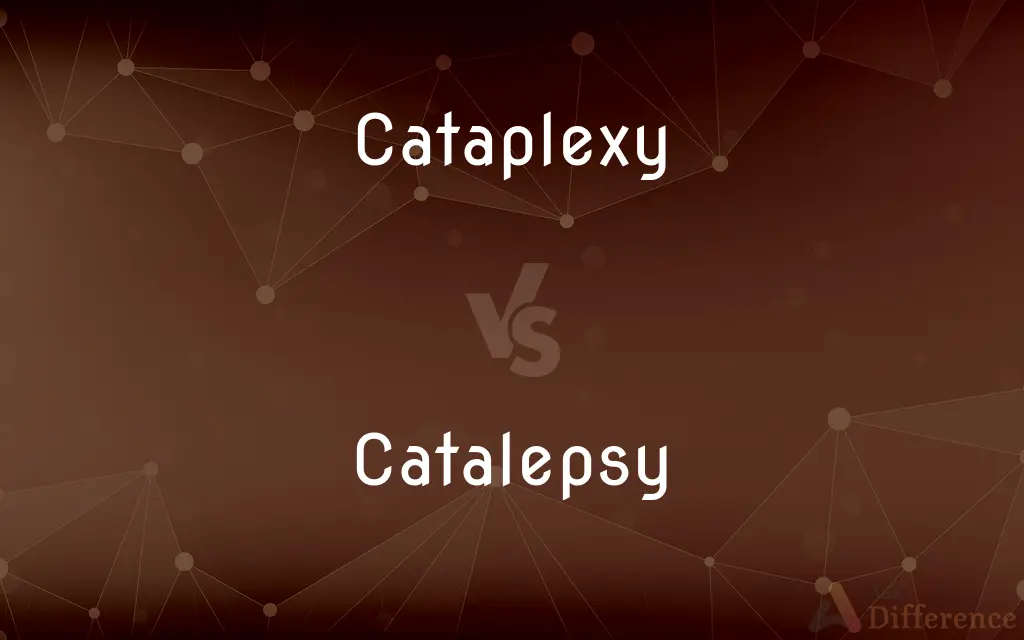Cataplexy vs. Catalepsy — What's the Difference?
By Tayyaba Rehman — Updated on October 16, 2023
Cataplexy is a sudden and uncontrollable muscle weakness typically triggered by strong emotions, while Catalepsy is characterized by rigidity, unresponsiveness, and often a fixed posture.

Difference Between Cataplexy and Catalepsy
Table of Contents
ADVERTISEMENT
Key Differences
Cataplexy and Catalepsy are both neurological conditions, but they manifest differently in individuals. Cataplexy is often associated with narcolepsy and is characterized by sudden muscle weakness or paralysis, often brought on by strong emotions such as laughter or anger.
Catalepsy, on the other hand, is more about rigidity and a lack of response. People with this condition might appear frozen in place, maintaining a fixed posture for extended periods. They might be unresponsive to external stimuli during an episode.
Cataplexy episodes can be quite brief, lasting a few seconds to a few minutes. The individual remains conscious during the episode, even if they might collapse or drop things. It's essential to understand that the person is aware but temporarily unable to move or speak.
While Catalepsy is less common, it has been historically linked to conditions such as schizophrenia and other psychotic disorders. Unlike cataplexy, where the individual remains conscious, someone experiencing a cataleptic episode may seem detached or unresponsive to their surroundings.
In summary, while both Cataplexy and Catalepsy are neurological disorders, they have distinct features. Cataplexy involves sudden muscle weakness, while Catalepsy is characterized by rigidity and unresponsiveness.
ADVERTISEMENT
Comparison Chart
Definition
Sudden and uncontrollable muscle weakness.
Rigidity, unresponsiveness, and fixed posture.
Associated With
Often linked to narcolepsy.
Historically linked to conditions like schizophrenia.
Consciousness
Individual remains conscious during episodes.
Individual may appear detached or unresponsive.
Duration
Episodes can be brief, lasting seconds to minutes.
Duration can vary, often longer than cataplexy episodes.
Trigger
Often triggered by strong emotions.
Can be spontaneous or linked to other conditions.
Compare with Definitions
Cataplexy
A neurological condition linked to narcolepsy.
Narcolepsy with cataplexy is a subtype of the sleep disorder.
Catalepsy
A neurological symptom associated with certain disorders.
Schizophrenia can sometimes present with catalepsy as a symptom.
Cataplexy
A symptom characterized by sudden muscle collapse.
He was diagnosed with narcolepsy after several cataplexy episodes.
Catalepsy
A condition where a person holds a fixed posture.
Catalepsy can sometimes be mistaken for a trance-like state.
Cataplexy
An episode where muscles fail to function properly.
Surprising news can sometimes lead to cataplexy in susceptible individuals.
Catalepsy
An episode of muscle stiffness and decreased sensitivity to pain.
The individual displayed catalepsy, maintaining a rigid posture without reacting to stimuli.
Cataplexy
A sudden loss of muscle tone.
During a fit of laughter, she experienced a cataplexy episode and dropped her glass.
Catalepsy
A state of motor rigidity and unresponsiveness.
During a catalepsy episode, she remained frozen in place for several minutes.
Cataplexy
A transient and uncontrollable muscle weakness.
Strong emotions can sometimes trigger cataplexy in individuals with narcolepsy.
Catalepsy
A trance or seizure with a loss of sensation or consciousness.
In some cultures, catalepsy has been linked to spiritual experiences.
Cataplexy
Cataplexy is a sudden and transient episode of muscle weakness accompanied by full conscious awareness, typically triggered by emotions such as laughing, crying, or terror. Cataplexy affects approximately 70% of people who have narcolepsy, and is caused by an autoimmune destruction of hypothalamic neurons that produce the neuropeptide hypocretin (also called orexin), which regulates arousal and has a role in stabilization of the transition between wake and sleep states.
Catalepsy
Catalepsy (from Ancient Greek katálēpsis, κατάληψις, "seizing, grasping") is a nervous condition characterized by muscular rigidity and fixity of posture regardless of external stimuli, as well as decreased sensitivity to pain.
Cataplexy
A sudden loss of muscle tone and strength, usually caused by an extreme emotional stimulus.
Catalepsy
A condition characterized by lack of response to external stimuli and by muscular rigidity, so that the limbs remain where they are positioned. It occurs in a variety of physical and psychological disorders, such as epilepsy and schizophrenia, and can be induced by hypnosis.
Cataplexy
(medicine) An abrupt loss of muscle tone, sometimes associated with narcolepsy.
Catalepsy
(pathology) A severe bodily condition, described in psychiatric pathology, marked by sudden rigidity, fixation of posture, and loss of contact with environmental conditions.
Cataplexy
A morbid condition caused by an overwhelming shock or extreme fear and marked by rigidity of the muscles.
Catalepsy
A sudden suspension of sensation and volition, the body and limbs preserving the position that may be given them, while the action of the heart and lungs continues.
Catalepsy
A trancelike state with loss of voluntary motion and failure to react to stimuli
Common Curiosities
Is Catalepsy a form of seizure?
Catalepsy is not a seizure, but it involves rigidity and can appear seizure-like.
Is Catalepsy common in schizophrenia?
Catalepsy can be a symptom in schizophrenia but is not present in all cases.
Can you communicate during a Catalepsy episode?
During Catalepsy, an individual might appear unresponsive or detached.
What causes Catalepsy?
Catalepsy can be linked to various conditions, including certain psychiatric disorders.
Can Cataplexy be dangerous?
While Cataplexy itself isn't harmful, the sudden muscle weakness can lead to falls or accidents.
Is Catalepsy always linked to another condition?
Often, but not always. Catalepsy can sometimes occur spontaneously.
Is Cataplexy only seen in narcolepsy?
Cataplexy is most commonly associated with narcolepsy but can be seen in other contexts.
Are Cataplexy and Catalepsy the same?
No, Cataplexy involves sudden muscle weakness, while Catalepsy is about rigidity and unresponsiveness.
What triggers Cataplexy?
Cataplexy is often triggered by strong emotions, like laughter or anger.
Can stress cause Cataplexy?
Cataplexy can be triggered by strong emotions, which may include stress.
How long does a Cataplexy episode last?
A Cataplexy episode can last from a few seconds to several minutes.
Is there a cure for Cataplexy?
There's no cure for Cataplexy, but treatments can help manage symptoms.
Is there a genetic component to Catalepsy?
Some studies suggest a genetic predisposition to Catalepsy, but it can also arise from other causes.
Are there medications for Cataplexy?
Yes, there are medications that can help control Cataplexy episodes.
How is Catalepsy diagnosed?
Catalepsy is diagnosed based on symptoms and medical history, often with other diagnostic tests.
Share Your Discovery

Previous Comparison
PP vs. PET
Next Comparison
Chancellor vs. ProvostAuthor Spotlight
Written by
Tayyaba RehmanTayyaba Rehman is a distinguished writer, currently serving as a primary contributor to askdifference.com. As a researcher in semantics and etymology, Tayyaba's passion for the complexity of languages and their distinctions has found a perfect home on the platform. Tayyaba delves into the intricacies of language, distinguishing between commonly confused words and phrases, thereby providing clarity for readers worldwide.
















































